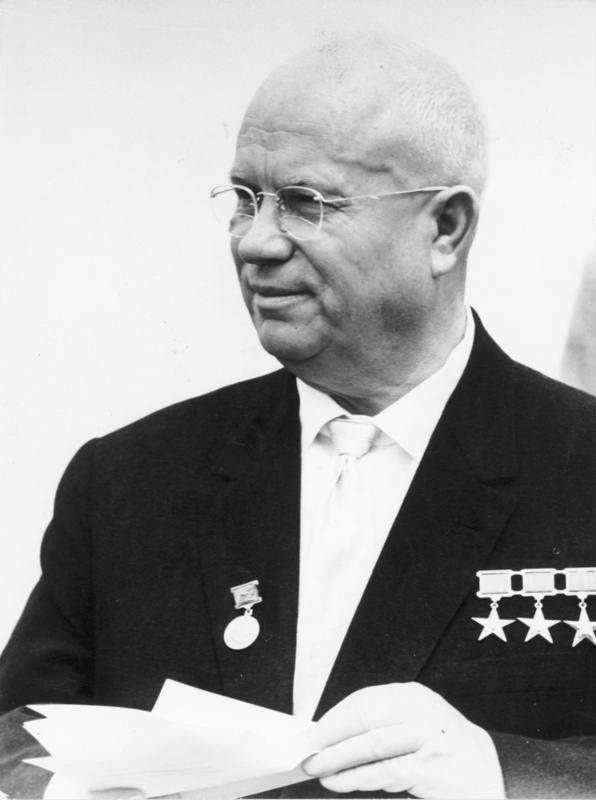Nikita Khrushchev
Nikita Khrushchev was the First Secretary of the Communist Party of the Soviet Union from 1953 to 1964. Best remembered for his denouncement of Stalin’s tyrannical regime and attempts at cooperation with non-Communist nations, Khrushchev introduced liberalisation to many aspects of Soviet life.
Born on April 15 1894 at Kalinovka, Nikita Khrushchev grew up in a poor family. Before World War One he worked as a metal worker and during the 1918 Russian Civil War he fought for the Red Army.
Following the Bolshevik victory, Khrushchev gained employment as assistant director for political affairs for the Rutchenkovo mine in 1921. While working in mining, he studied at a technical college in Yuzovka.
Khrushchev worked for the Communist Party first in Kiev and then in Moscow, where he studied at the Stalin Industrial Academy. Whilst working for the Moscow city Party Organization Khrushchev bolstered his reputation through his close involvement in the project to build the Moscow Metro, which opened on 1 May 1935. The project was considered a triumph in engineering and proof to the world of Soviet technological expertise.

Krushchev quickly climbed the Communist party ladder. In 1935 he became First Secretary of the Moscow Regional Committee.
In 1937 Khrushchev was appointed by Joseph Stalin as leader of the Communist Party in Ukraine. From 1938 to 1947, Khrushchev was largely involved in Ukrainian affairs. During the Second World War Khrushchev gave support to soldiers fighting in Ukraine, mainly in the Kursk Salient. Khrushchev was Chairman of the Council of People’s Commissars in Ukraine from February 1944 to March 1946.
In 1947, Khrushchev was chosen to reorganise the agricultural production of the Soviet Union. Stalin apparently trusted him, and by the time of Stalin’s death in 1953, Khrushchev was a member of the Communist Party’s Presidium. On 12 September 1953, he was appointed First Secretary of the Party. This position allowed Khrushchev to gainsupproters throughout the Party’s administrative machinery and to solidify his power base. Khrushchev's influence helped Bulganin, his nominee, be elected as Premier in February 1955. Though Bulganin was ostensibly in power, the man with the real power was Khrushchev.
In January 1956, Khrushchev made an extremely bold move. At the 20th Party Congress he made a speech entitled On the Cult of Personality and its Consequences. In this speech, Khrushchev openly attacked Stalin and ‘cult of personality’. He denounced the purges and argued that Stalin had gone against the Communist Party’s ideals of collective leadership. Khrushchev's radical audacity in criticising Stalin created shockwaves that rippled through the Communist Party.
On 27 March 1958, Khrushchev became Premier of the USSR. He continued to hold the post of First Secretary and Bulganin was sidelined.
After Stalin’s time in office, Khrushchev’s appointment was greeted with cautious optimism in the West. However, Khrushchev was unpredictable. He stormed out of a meeting during a meeting with Dwight Eisenhower in Paris in 1960 when the American President refused one of his demands. And during a meeting of the UN General Assembly in 1960, he allegedly took off his shoe and banged it on the table to emphasise his point!
It is difficult to ascertain whether Khrushchev was a bellicose ‘hawk’ or a peace-loving ‘dove’. After the Cuban Missile Crisis many people assumed he was a ‘hawk’. However, this may have been an unfair assessment.
Khrushchev was angered that America had placed military equipment, including B52 bombers, in Turkey. However, Turkey was a member of NATO so from a Western perspective NATO was entitled to make this move. To the USSR, this was highly provocative behaviour. Turkey shared a border with the USSR.
When Khrushchev was given the opportunity to counter this move by placing medium range nuclear missiles in Cuba, he seized it. He argued that the missiles would give the Communist Caribbean island greater protection in the event of another Bay of Pigs incident (in 1961, the CIA had sponsored a failed military invasion of Cuba).
During the crisis (14-28 October 1962) Khrushchev gave no indication of backing down against J F Kennedy. When he finally did, his humiliating climb-down weakened his political position at home. In exchange for the removal of the missiles, America promised never to invade Cuba. They also promised to withdraw missiles from Turkey, but Khrushchev was not able to exploit this agreement politically because the promise was made in secret.
Khrushchev's colleagues were also concerned that relationship between the USSR and Communist China was deteriorating. He was levered out of office in October 1964. He was succeeded by Alexei Kosygin as Prime Minister and Leonid Brezhnev as Party Leader.
See also: Fidel Castro
MLA Citation/Reference
"Nikita Khrushchev". HistoryLearning.com. 2024. Web.
Key facts
| Name: | Nikita Khrushchev |
| Birth Date: | 15 April 1894 Kalinovka, Dmitrievsky Uyezd,, Kursk Governorate,Russian Empire |
| Death: | 11 September 1971 (aged 77), Moscow, Russian SFSR,Soviet Union |
| Political affiliations: | Communist Party |
| Spouse(s): |
|
